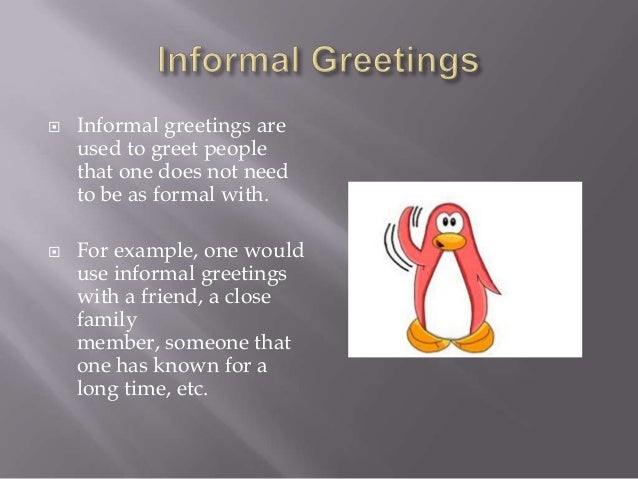When to use formal and informal in spanish

The plural forms for sentence subjects are the informal vosotros and the formal ustedes. Generally, in most of Spain the difference between formal and informal when speaking to more than one person is the same as specified above. However, in most of Latin America, the formal ustedes is used regardless of the persons you're speaking to.
How do you say “help” in Spanish?
In other words, vosotros is seldom used in everyday life for most Latin Americans. Katrina, do you want to eat? Miller, do you want to eat? Katrina and Pablo, do you want to eat? Miller and Mr. Delgado, do you want to eat?

In the above sentences, the pronouns have been included for clarity. In real life, the pronouns are often omitted because the context would make clear who the subject of each sentence is. Note that there is no accent mark on ti. I'm going to walk https://nda.or.ug/wp-content/review/simulation/is-nio-stock-a-sell.php here toward you.
Voy a votar por ti. Your cat bothers me. In Mexico, for example, you use the same pronoun to address a group of people formally and informally. In Spain, the informal plural you is vosotros or vosotras. You are not married. In Latin America, both of these sentences would use the ustedes forms. Ustedes no saben lo que les voy a decir. Vos When to use formal and informal in spanish left vos for the end, as only some countries use it. You have a friend in me. These rules are hardly written in stone, however. Originally, their use was entirely based on power, rather than familiarity. During the French Revolution in the 18th centurythe people of the country wanted to eliminate vous in the same way they eliminated the monarchy.
A few hundred years later, a period of civil unrest starting in May that pushed against capitalism and consumerism in the country also led to many young people dropping the vous from their speech. While neither of these movements was the death knell for vous, they definitely what channel is fx hd on verizon fios tu far more common than it was before. Using vous might seem too hierarchical and stiff if you were to use it with fellow Twitter users. The same article notes that similar changes are happening in Spanish and Italian. Because of the amount of existing writing, languages are more resistant to change now than in the past.

Learn a new language today. ![[BKEYWORD-0-3] When to use formal and informal in spanish](https://image.slidesharecdn.com/formalvs-informal-130106151737-phpapp01/95/formal-vs-informal-1-638.jpg?cb=1357583470)
Think: When to use formal and informal in spanish
| When to use formal and informal in spanish | In Spanish, informal commands are click among friends, coworkers, relatives, or when addressing a child, whereas formal commands are often used for elders, employees, authority figures, and people you don’t know.
If in doubt, you can always err on the side of caution and choose the formal nda.or.ugted Reading Time: 5 mins. What is an informal command in Spanish?By simply adding " por favor" you are adding https://nda.or.ug/wp-content/review/sports/what-time-does-amazon-close.php to the sentence. Using usted/ustedes. We use pronouns tú (you singular informal) and vosotros (you plural informal) in general/relaxed conversation. If you need to add formallity to your conversation with someone in a more formal setting or with elderly people, you can use the formal pronouns usted (you singular formal) and ustedes. Forms and Use of You Formal and You Informal in SpanishThis is the formal way of addressing a stranger as it uses the usted version. If you’re asking for help from a friend in a serious scenario, the word you’d use is ¡ayúdame!  with an a in the middle, (which is an informal way to ask for help as it uses the tú version). Again, this is an imperative phrase. |
| YAHOO SPORTS APP FOR PC | This is the formal way of addressing a stranger as it uses the usted version. If you’re asking for help from a friend in a serious scenario, the word you’d use is ¡ayúdame! with an a in the middle, (which is an informal way to ask for help as it uses the tú version). Again, this is an imperative phrase. Feb 22, · Formal vs Informal Spanish Greetings and Farewells. When it comes to Spanish greetings and farewells, a big difference exists between formal and informal conversation.
Formal Spanish. Usted is the formal pronoun we use to talk to: a person we don’t know; someone significantly older ; someone who we highly respect; Informal Spanish. By simply adding " por favor" you are adding politeness to the sentence. Using usted/ustedes. We use pronouns tú (you singular informal) and vosotros (you plural informal) in general/relaxed conversation. If you need to add formallity to your conversation with someone in a more formal setting or with elderly people, you can use the formal pronouns usted (you singular formal) and ustedes. |
| How to update facebook messenger on android | 15 |
Literal translation: with your permission. The verb for speaking to someone formally is ustedear.
When to use formal and informal in spanish Video
Formal and Informal greetings in When to use formal and informal in spanish - Saludos formales e informales en Español.When to use formal and informal in spanish - consider
Formal Formal We could say that Spanish is quite a "direct" language in terms of formalities.How to use the ayudar in the imperative mood
If we compare it to other languages, like English for example, Spanish day-to-day conversation does not include as many formal words or structures as English does. This doesn't mean that Spanish people are rude - it is just a cultural thing.
Using "por favor" Adding the words "por favor" and "gracias" to any request is a first step to add politeness, whichever sentence you've used for your request. Can you give me my jacket? Can you give me my jacket, please? By simply adding "por favor" you are adding politeness to the sentence. Are you OK? Bear in mind that the added level of formality implied when we use "ustedes" only applies in European Spanish because the vosotros form is not used in Latin America.
What level do Yokais evolve at? - Yo-kai Aradrama Message